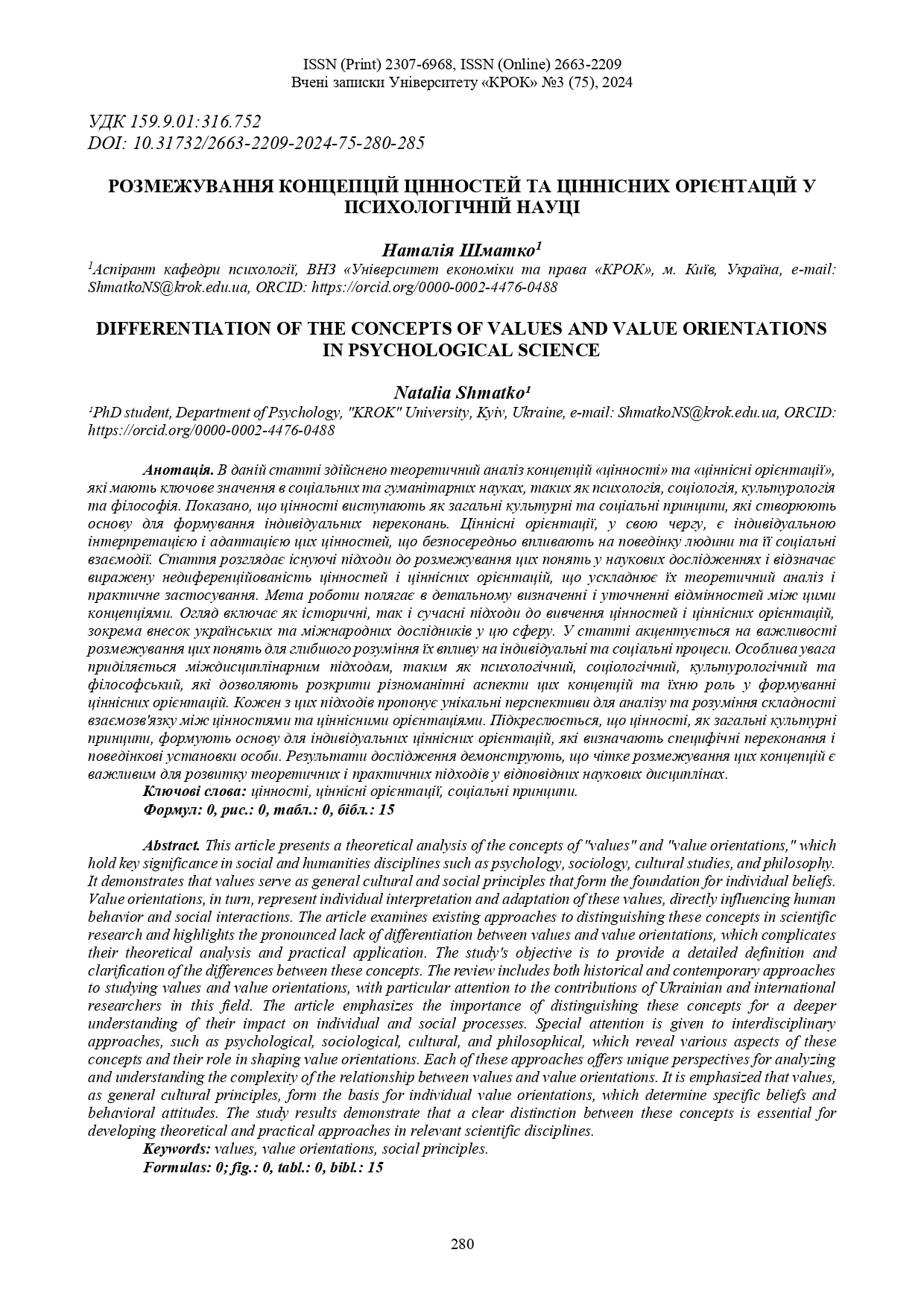DIFFERENTIATION OF THE CONCEPTS OF VALUES AND VALUE ORIENTATIONS IN PSYCHOLOGICAL SCIENCE
DOI:
https://doi.org/10.31732/2663-2209-2024-75-280-285Keywords:
values, value orientations, social principlesAbstract
This article presents a theoretical analysis of the concepts of "values" and "value orientations," which hold key significance in social and humanities disciplines such as psychology, sociology, cultural studies, and philosophy. It demonstrates that values serve as general cultural and social principles that form the foundation for individual beliefs. Value orientations, in turn, represent individual interpretation and adaptation of these values, directly influencing human behavior and social interactions. The article examines existing approaches to distinguishing these concepts in scientific research and highlights the pronounced lack of differentiation between values and value orientations, which complicates their theoretical analysis and practical application. The study's objective is to provide a detailed definition and clarification of the differences between these concepts. The review includes both historical and contemporary approaches to studying values and value orientations, with particular attention to the contributions of Ukrainian and international researchers in this field. The article emphasizes the importance of distinguishing these concepts for a deeper understanding of their impact on individual and social processes. Special attention is given to interdisciplinary approaches, such as psychological, sociological, cultural, and philosophical, which reveal various aspects of these concepts and their role in shaping value orientations. Each of these approaches offers unique perspectives for analyzing and understanding the complexity of the relationship between values and value orientations. It is emphasized that values, as general cultural principles, form the basis for individual value orientations, which determine specific beliefs and behavioral attitudes. The study results demonstrate that a clear distinction between these concepts is essential for developing theoretical and practical approaches in relevant scientific disciplines.
Downloads
References
Бабенко, Ю. (2013). Теоретичні аспекти дослідження цінностей. Вісник Національної академії керівних кадрів культури і мистецтв. Випуск 3. 88–93. URL: http://nbuv.gov.ua/UJRN/vdakkkm_2013_3_23
Ковалькова, Т. (2017). Ціннісні орієнтації особистості як чинник запобігання емоційному вигоранню вчителів. Правничий вісник Університету «КРОК». № 29. 214–222. URL: https://library.krok.edu.ua/media/library/category/zhurnali/pravnychyi-visnyk-universytetu-krok/pravnychyi-visnyk-universytetu-krok-n29.pdf
Кононенко, О. & Кононенко, А. & Крошка, К. & Базика, Є. (2023). Життєстійкість та ціннісні орієнтації особистості як психологічні ресурси її психологічного здоров’я. Наукові перспективи. № 9 (39). 565–575. DOI: https://doi.org/10.52058/2708-7530-2023-9(39)-565-575
Коханова, О. (2015). Цінності та ціннісні орієнтації, їх роль у розвитку особистості. Науковий вісник ХДУ. Серія: Психологічні науки. Випуск 3. 108–112. URL: https://elibrary.kubg.edu.ua/id/eprint/13895/1/O_Kokhanova_HVHDU_3_IL.pdf
Матяж, С. & Березянська, А. (2013). Класифікація цінностей та ціннісних орієнтацій особистості. Наукові праці Чорноморського державного університету імені Петра Могили комплексу «Києво-Могилянська академія». Серія: Соціологія. Випуск 213. 27-30. URL https://kse.ua/wp-content/uploads/2020/08/Npchdusoc_2013_225_213_7.pdf
Місенг, Д. (2020). Вплив ціннісних орієнтацій на стиль життя особистості. (Дисертація на здобуття наукового ступеня кандидата психологічних наук). Київ. URL: https://ispp.org.ua/wp-content/uploads/2020/09/Diser_Miseng.pdf
Панчук, Н. (2015). Ціннісні орієнтації як складова життєвих стратегій особистості. Збірник наукових праць К-ПНУ імені Івана Огієнка, Інституту психології імені Г.С.Костюка НАПН України. Випуск 27. 411-421. DOI:
https://doi.org/10.32626/2227-6246.2015-27.%25p
Полінкова, М. О., Сингаївська, І. В. (2022). Взаємозв'язок ціннісних орієнтацій та ставлення до шлюбу та сім'ї. Держава, регіони, підприємництво: інформаційні, суспільно-правові, соціально-економічні аспекти розвитку: тези доповідей ІV Міжнародної конференції (Київ, 07 грудня 2022 р.). К.: Університет "КРОК". 301-304. https://conf.krok.edu.ua/SRE/SRE-2022/paper/view/1276
Христенко, О. (2023). Теоретико-методичні засади розвитку системи цінностей студентів у медичних закладах вищої освіти України (друга половина ХХ – 20-ті рр. ХХІ ст.). (Дисертація на здобуття наукового ступеня доктора педагогічних наук). Тернопіль. Дрогобич. URL: https://uacademic.info/ua/document/0523U100257
Щербань, А. (2014). Ціннісні орієнтації особистості та їх класифікація. Соціальні технології: актуальні проблеми теорії та практики. Випуск 64. 194–198. URL: http://nbuv.gov.ua/UJRN/stapttp_2014_64_25
Bogaert, S. & Boone, C. & Declerck, C. (2008). Social value orientation and cooperation in social dilemmas: A review and conceptual model. Social Psychology. Volume 47. Issue 3. 453-480. DOI: https://doi.org/10.1348/014466607X244970
Rokeach, M. (1973). The nature of human values. Free Press
Schwartz, S. H. (1992). The structure of human values: A fundamental approach. Sage Publications.
Thomas, W. I., & Znaniecki, F. (1920). The Polish peasant in Europe and America (Vol. 1 & 2). The University of Chicago Press.
Weber, J. (2017). Discovering the Millennials’ Personal Values Orientation: A Comparison to Two Managerial Populations. J Bus Ethics 143, 517–529. https://doi.org/10.1007/s10551-015-2803-1

Downloads
Published
How to Cite
Issue
Section
License

This work is licensed under a Creative Commons Attribution-NonCommercial 4.0 International License.

